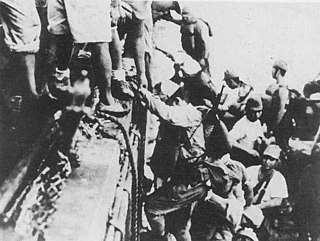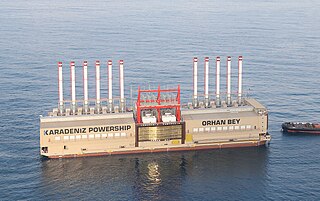Related Research Articles

The Tokyo Express was the name given by Allied forces to the use of Imperial Japanese Navy ships at night to deliver personnel, supplies, and equipment to Japanese forces operating in and around New Guinea and the Solomon Islands during the Pacific campaign of World War II. The operation involved loading personnel or supplies aboard fast warships, later submarines, and using the warships' speed to deliver the personnel or supplies to the desired location and return to the originating base all within one night so Allied aircraft could not intercept them by day.

Operation Trident was an offensive operation launched by the Indian Navy on Pakistan's port city of Karachi during the Indo-Pakistani War of 1971. Operation Trident saw the first use of anti-ship missiles in combat in the region. The operation was conducted on the night of 4–5 December and inflicted heavy damage on Pakistani vessels and facilities. While India suffered no losses, Pakistan lost a minesweeper, a destroyer, a cargo vessel carrying ammunition, and fuel storage tanks in Karachi. Another destroyer was also badly damaged and eventually scrapped. India celebrates its Navy Day annually on 4 December to mark this operation. Trident was followed up by Operation Python three days later.

Sealift is a term used predominantly in military logistics and refers to the use of cargo ships for the deployment of military assets, such as weaponry, vehicles, military personnel, and supplies. It complements other means of transport, such as strategic airlifts, in order to enhance a state's ability to project power.

An auxiliary ship is a naval ship designed to support combatant ships and other naval operations. Auxiliary ships are not primary combatant vessels, though they may have some limited combat capacity, usually for purposes of self-defense.
Operation Python, a follow-up to Operation Trident, was the code name of a naval attack launched on West Pakistan's port city of Karachi by the Indian Navy during the Indo-Pakistani War of 1971. After the first attack during Operation Trident on the Port of Karachi, Pakistan stepped up aerial surveillance of its coast as the presence of large Indian Navy ships gave the impression that another attack was being planned. Pakistani warships attempted to outsmart the Indian Navy by mingling with merchant shipping. To counter these moves, Operation Python was launched on the night of 8/9 December 1971. A strike group consisting of one missile boat and two frigates attacked the group of ships off the coast of Karachi. While India suffered no losses, Pakistani fleet tanker PNS Dacca was damaged beyond repair, and the Kemari Oil Storage facility was lost. Two other foreign ships stationed in Karachi were also sunk during the attack.

USS Coronis (ARL-10) was one of 39 Achelous-class repair ship landing craft built for the United States Navy during World War II. Named for Coronis, she was the only US Naval vessel to bear the name.

A powership is a special purpose ship, on which a power plant is installed to serve as a power generation resource.
Ambika class is a class of Replenishment Vessel currently in service with the Indian Navy. INS Ambika is the only ship in this class.
INS Purak is a self-propelled fuel carrier barge built by Modest Infrastructure Ltd in Bhavnagar, Gujarat, for the Indian Navy.
INS Puran is a self-propelled fuel carrier barge built by Modest Infrastructure Ltd in Bhavnagar, Gujarat, for the Indian Navy.
INS Poshak is a self-propelled fuel carrier barge built by M/s Shalimar Works, Kolkata for the Indian Navy.
The Hooghly-class of fuel barge is a series of service watercraft being built by Hooghly Dock & Port Engineers Ltd, Kolkata (HDPEL) for the Indian Navy.
Shalimar Works (1980) Ltd. is a public sector shipbuilding company of West Bengal, India. It owns a small shipyard on the right bank of the Hooghly River at Shibpur, Howrah. The origin of shipyard can be traced back to 1885.
Corporated-class of sullage barges are a series of seven yard craft being built by M/s Corporated Shipyard Private Limited, Kolkata for the Indian navy.
The Modest class of barges is a series of self-propelled fuel carrier watercraft being built by Modest Infrastructure Ltd in Bhavnagar, Gujarat, for the Indian Navy.
Puran class of barge is a series of self-propelled fuel carrier built by Rajabagan Dockyard (RBD) for the Indian Navy.

The Type B ship is a United States Maritime Administration (MARAD) designation for World War II barges. Barges are very low cost to build, operate and move. Barges were needed to move large bulky cargo. A tug boat, some classed as Type V ships, could move a barge, then depart and move on to the next task. That meant the barge did not have to be rushed to be unloaded or loaded. Toward the end of World War 2, some ships that had not been completed in time for the war were converted to barges. US Navy barges are given the prefix: YWN or YW. Due to shortage of steel during World War II, concrete ship constructors were given contracts to build concrete barges, with ferrocement and given the prefix YO, YOG, YOGN. Built in 1944 and 1945, some were named after chemical elements.

USS Paiute (ATF-159) was an Abnaki-class tug of the United States Navy during World War II, the Korean War, Vietnam War, and Persian Gulf War. She served a total of 44 years before being scrapped.

Joseph Marie LaBarge was an American steamboat captain, most notably of the steamboats Yellowstone, and Emilie, that saw service on the Mississippi and Missouri rivers, bringing fur traders, miners, goods and supplies up and down these rivers to their destinations. During much of his career LaBarge was in the employ of the American Fur Company, a giant in the fur trading business, before building his own steamboat, the Emilie, to become an independent riverman. During his career he exceeded several existing speed and distance records for steamboats on the Missouri River. Passengers aboard his vessels sometimes included notable people, including Abraham Lincoln. LaBarge routinely offered his steamboat services gratis to Jesuit missionaries throughout his career.

The IRS-class ACTCM barge is a series of 19 ammunition barge being built by M/s Suryadipta Projects Pvt Ltd, and SECON Engineering Projects Pvt. Ltd.; MSMEs under a contract for the Indian Navy signed on 5 March 2021 and 19 February 2021 respectively. While Suryadipta Projects is from Thane, Maharashtra; and SECON Engineering Projects is from Visakhapatnam, Andhra Pradesh. As per the contract, Suryadipta Projects will build 11 Ammunition cum Torpedo cum Missile (ACTCM) barge and SECON Engineering Projects will build 8 Missile cum Ammunition (MCA) barge, respectively. The barges are either based at INS Tunir, Naval Missile Depot at Mumbai, or Naval Ammunition Depot (NAD), Karanja at Naval Dockyard (Mumbai) {ND(Mbi)}.